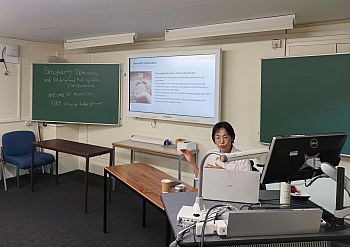Hansalim Life Movement: Food for Thought on Transformative Learning and Democratic Movements
The latest SSRP Visiting Fellow seminar (July 10) served up an appetising alternative to the industrialised food systems and processed food that saturate modern Western society.
Dr Miseong Cho, Senior Researcher at the Mosim and Salim Research Institute and Guest Lecturer at Seoul National University, presented research from her study of the Hansalim Life Movement, South Korea’s biggest multi-stakeholder food cooperative.
Dr Cho’s talk was followed by a panel discussion with SSRP Fellows Dr Jonathan Dolley, who also researches Hansalim, and Dr Adrian Ely, who specialises in food security.
The objective of Dr Cho’s research is to assess the importance of grassroots transformative learning in relation to food and agricultural cooperatives, using Hansalim as a case site. Transformative learning, Dr Cho explained, describes shifts of individual and collective consciousness after traumatic events.
The concept has a planetary dimension, encouraging a view of humans as part of an interconnected ecosystem.
Hansalim was born amid the pro-democracy movement in South Korea in the 1980s. Starting as a small store which sold rice and eggs, with direct trade between farmers and consumers, it has grown into a collective of over 900,000 consumer members.
In keeping with the trauma that can ignite transformative learning, Hansalim was formed in reaction to crisis. Its founders were trying to overcome the instability and violent struggles of 1980s South Korea, while farmers who had been the victims of pesticide poisoning and consumers suffering from health problems later joined the movement.
Dr Cho explained that around 70% of the sales price goes back to the producers of food within Hansalim, with Dr Dolley later adding that it also supplies household goods and clothing.
To gain insight into the philosophy and practices of Hansalim, Dr Cho conducted a literature review spanning 40 years of research, while also interviewing 16 members of the movement.
One of the key principles of Hansalim is that the producer protects the consumer’s life – by providing healthy and nutritious food – and the consumer in turn ensures the producer’s livelihood. In Korean, ‘Han’ means great, one, whole, universe, and together, while ‘salim’ means domestic work, and to revive and give life.
Hansalim’s symbol and mantra, the ‘universe in a bowl of rice’, has had a profound emotional impact on members of its community, including one of Dr Cho’s interviewees who reported a ‘heart-pounding’ sensation when reflecting on the significance of that message.
According to her findings, Hansalim has induced a mindset change in many of its members, who experience a new or rekindled appreciation for life, agriculture and nature. Being part of the community also engenders a collective identity.
The nature of Hansalim as a democratic movement means its processes are not always quick or efficient in the conventional sense, Dr Cho said, adding that it took 17 years for Hansalim to reach a particular agreement around the issue of fair trade.
Dr Dolley later acknowledged that this slowness had presented some problems for the movement, but said that the collective philosophy of Hansalim was its most important value. Dr Ely added that traditional models of business and agricultural efficiency have often been damaging to the environment.
While all of the presenters and panellists agreed that the Hansalim example could not simply be transplanted to other regions around the world, Dr Cho concluded with five implications she had drawn from her investigation:
1) There is a complicated configuration or constellation of factors behind democratic movements, which take time to address.
2) The role of emotion is central to transformative learning, such as the ‘heart-pounding’ experience of the aforementioned Hansalim farmer.
3) There is a need for spaces to enhance and mature collective transformative learning.
4) Cooperatives like Hansalim force us to consider the conflict and contradictions between current systems and alternative agricultural food systems, an important step towards socio-ecological transformation.
5) Collective transformative learning is not a preparation for a transformation, but transformation itself. Transformative learning and socio-ecological transformation occur simultaneously.
SSRP would like to thank Dr Miseong Cho for her insightful presentation and wish her all the best with her ongoing research.

Dr Miseong Cho presenting on the Hansalim Life Movement